Study Skills for Higher Education: Listening and Skills Essay
VerifiedAdded on 2022/12/05
|12
|3706
|103
Essay
AI Summary
This essay delves into essential study skills crucial for success in higher education. It begins by examining listening challenges students face in academic settings, such as dealing with unnecessary words, long sentences, and technical jargon, while also suggesting strategies for teachers to improve student listening skills, including the use of hand gestures and technology. The essay then reflects on the author's personal listening challenges and the strategies employed to overcome them. The second part of the essay identifies and discusses six key skills vital for university success, including adaptive thinking, communication, collaboration, critical thinking, creativity, and technology skills, highlighting their importance in the workplace. It also provides recommendations for improving the content of student CVs. Overall, the essay emphasizes the importance of effective listening and a range of academic and professional skills for achieving academic and career goals.
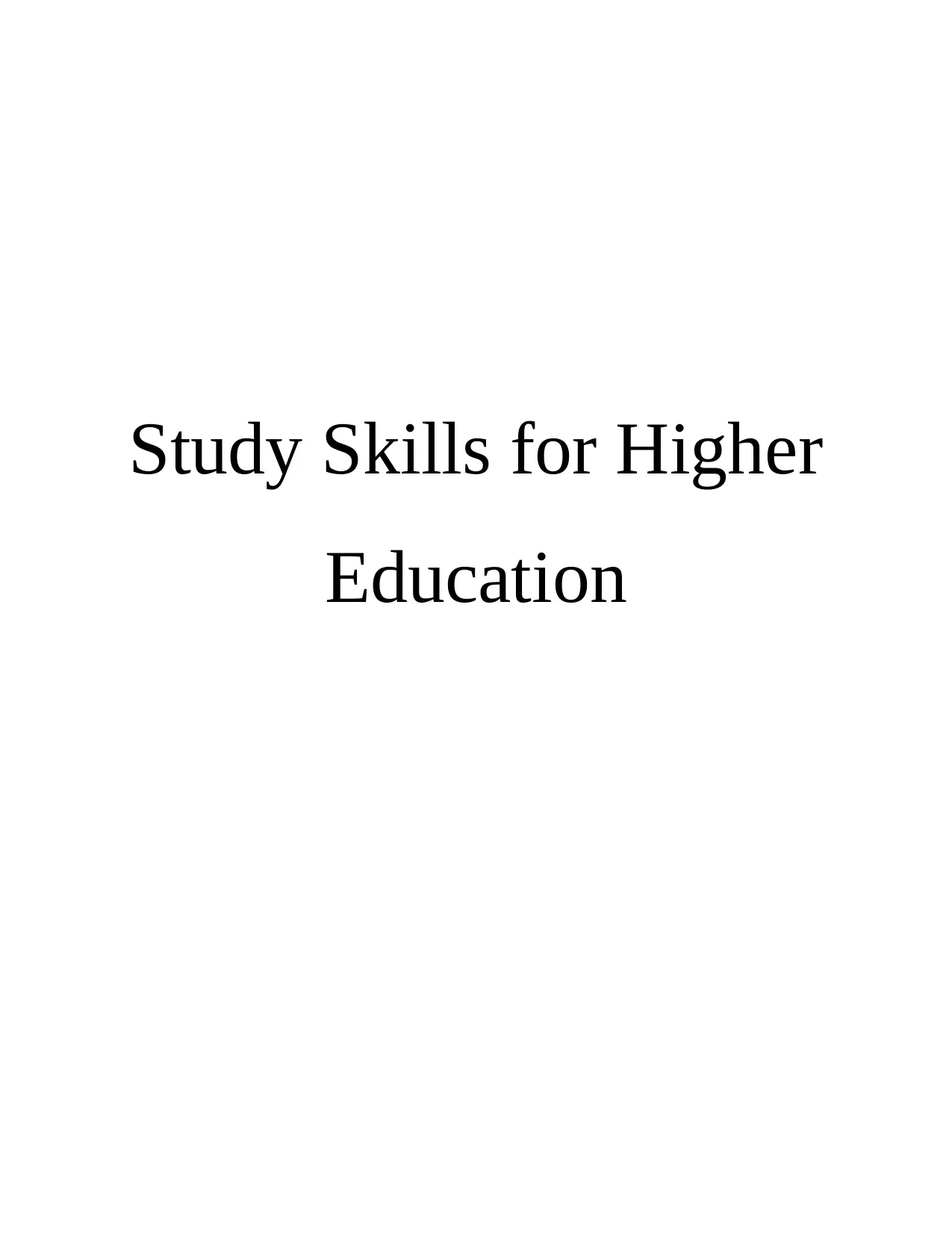
Study Skills for Higher
Education
Education
Paraphrase This Document
Need a fresh take? Get an instant paraphrase of this document with our AI Paraphraser
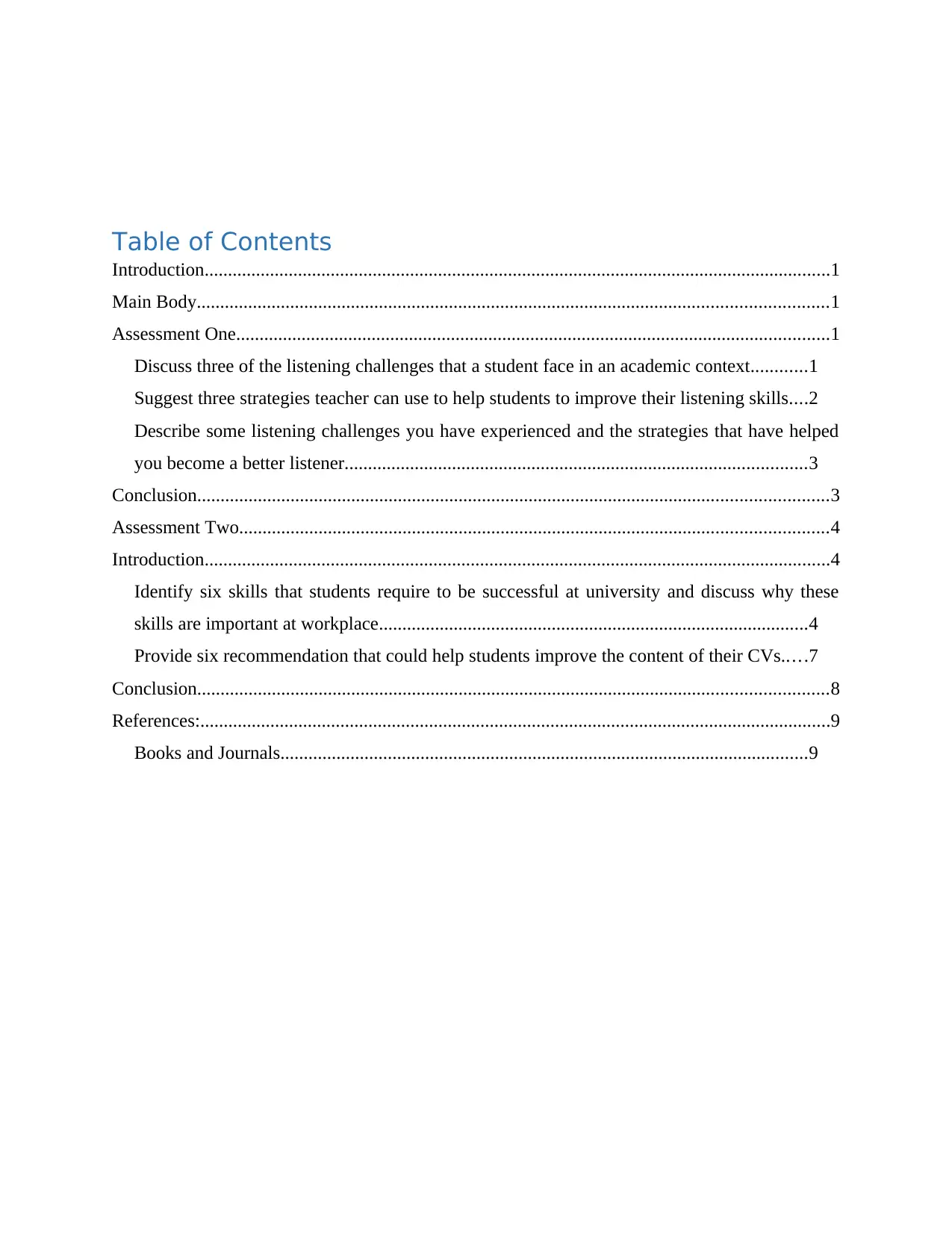
Table of Contents
Introduction......................................................................................................................................1
Main Body.......................................................................................................................................1
Assessment One...............................................................................................................................1
Discuss three of the listening challenges that a student face in an academic context............1
Suggest three strategies teacher can use to help students to improve their listening skills....2
Describe some listening challenges you have experienced and the strategies that have helped
you become a better listener...................................................................................................3
Conclusion.......................................................................................................................................3
Assessment Two..............................................................................................................................4
Introduction......................................................................................................................................4
Identify six skills that students require to be successful at university and discuss why these
skills are important at workplace............................................................................................4
Provide six recommendation that could help students improve the content of their CVs.....7
Conclusion.......................................................................................................................................8
References:.......................................................................................................................................9
Books and Journals.................................................................................................................9
Introduction......................................................................................................................................1
Main Body.......................................................................................................................................1
Assessment One...............................................................................................................................1
Discuss three of the listening challenges that a student face in an academic context............1
Suggest three strategies teacher can use to help students to improve their listening skills....2
Describe some listening challenges you have experienced and the strategies that have helped
you become a better listener...................................................................................................3
Conclusion.......................................................................................................................................3
Assessment Two..............................................................................................................................4
Introduction......................................................................................................................................4
Identify six skills that students require to be successful at university and discuss why these
skills are important at workplace............................................................................................4
Provide six recommendation that could help students improve the content of their CVs.....7
Conclusion.......................................................................................................................................8
References:.......................................................................................................................................9
Books and Journals.................................................................................................................9
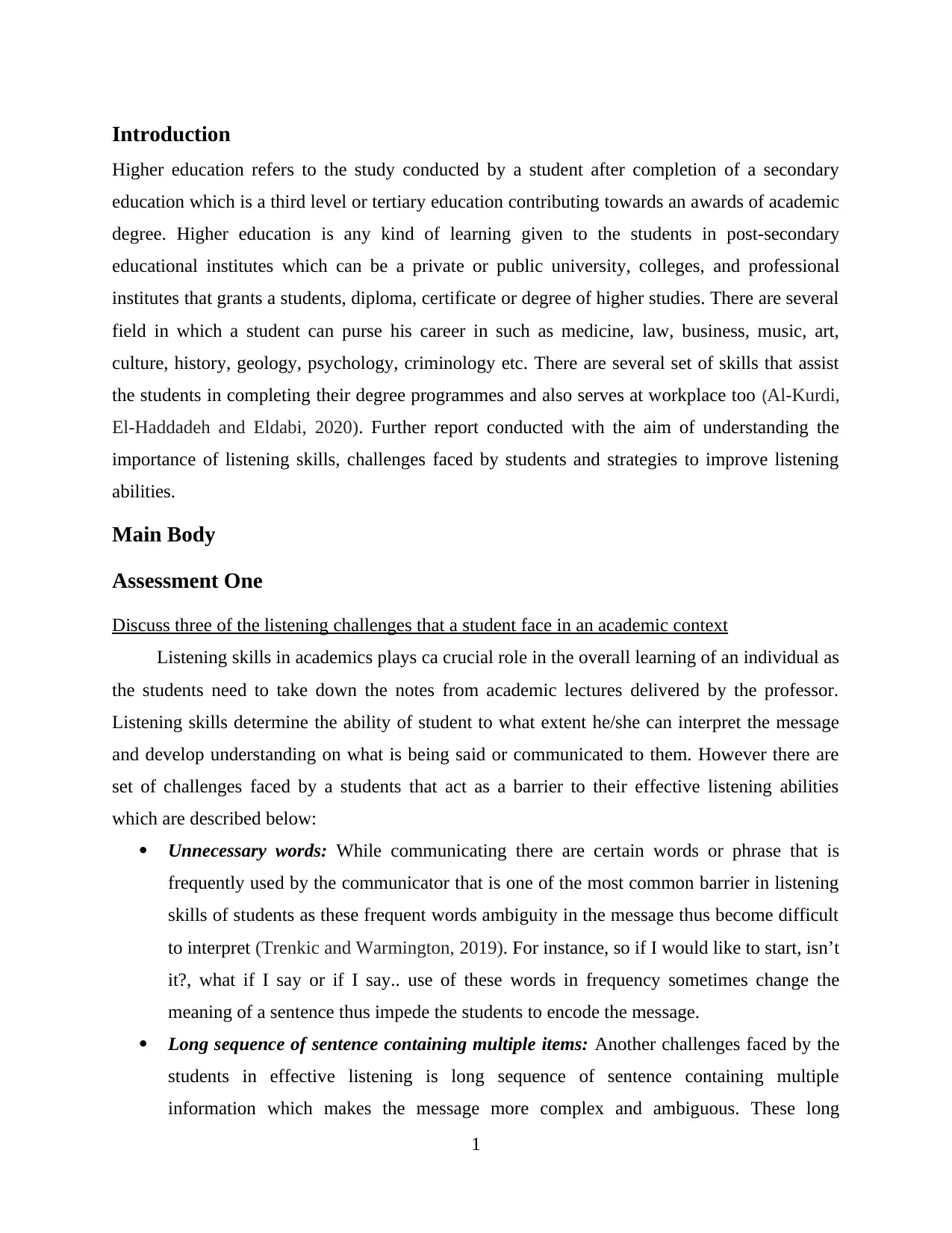
Introduction
Higher education refers to the study conducted by a student after completion of a secondary
education which is a third level or tertiary education contributing towards an awards of academic
degree. Higher education is any kind of learning given to the students in post-secondary
educational institutes which can be a private or public university, colleges, and professional
institutes that grants a students, diploma, certificate or degree of higher studies. There are several
field in which a student can purse his career in such as medicine, law, business, music, art,
culture, history, geology, psychology, criminology etc. There are several set of skills that assist
the students in completing their degree programmes and also serves at workplace too (Al-Kurdi,
El-Haddadeh and Eldabi, 2020). Further report conducted with the aim of understanding the
importance of listening skills, challenges faced by students and strategies to improve listening
abilities.
Main Body
Assessment One
Discuss three of the listening challenges that a student face in an academic context
Listening skills in academics plays ca crucial role in the overall learning of an individual as
the students need to take down the notes from academic lectures delivered by the professor.
Listening skills determine the ability of student to what extent he/she can interpret the message
and develop understanding on what is being said or communicated to them. However there are
set of challenges faced by a students that act as a barrier to their effective listening abilities
which are described below:
Unnecessary words: While communicating there are certain words or phrase that is
frequently used by the communicator that is one of the most common barrier in listening
skills of students as these frequent words ambiguity in the message thus become difficult
to interpret (Trenkic and Warmington, 2019). For instance, so if I would like to start, isn’t
it?, what if I say or if I say.. use of these words in frequency sometimes change the
meaning of a sentence thus impede the students to encode the message.
Long sequence of sentence containing multiple items: Another challenges faced by the
students in effective listening is long sequence of sentence containing multiple
information which makes the message more complex and ambiguous. These long
1
Higher education refers to the study conducted by a student after completion of a secondary
education which is a third level or tertiary education contributing towards an awards of academic
degree. Higher education is any kind of learning given to the students in post-secondary
educational institutes which can be a private or public university, colleges, and professional
institutes that grants a students, diploma, certificate or degree of higher studies. There are several
field in which a student can purse his career in such as medicine, law, business, music, art,
culture, history, geology, psychology, criminology etc. There are several set of skills that assist
the students in completing their degree programmes and also serves at workplace too (Al-Kurdi,
El-Haddadeh and Eldabi, 2020). Further report conducted with the aim of understanding the
importance of listening skills, challenges faced by students and strategies to improve listening
abilities.
Main Body
Assessment One
Discuss three of the listening challenges that a student face in an academic context
Listening skills in academics plays ca crucial role in the overall learning of an individual as
the students need to take down the notes from academic lectures delivered by the professor.
Listening skills determine the ability of student to what extent he/she can interpret the message
and develop understanding on what is being said or communicated to them. However there are
set of challenges faced by a students that act as a barrier to their effective listening abilities
which are described below:
Unnecessary words: While communicating there are certain words or phrase that is
frequently used by the communicator that is one of the most common barrier in listening
skills of students as these frequent words ambiguity in the message thus become difficult
to interpret (Trenkic and Warmington, 2019). For instance, so if I would like to start, isn’t
it?, what if I say or if I say.. use of these words in frequency sometimes change the
meaning of a sentence thus impede the students to encode the message.
Long sequence of sentence containing multiple items: Another challenges faced by the
students in effective listening is long sequence of sentence containing multiple
information which makes the message more complex and ambiguous. These long
1
⊘ This is a preview!⊘
Do you want full access?
Subscribe today to unlock all pages.

Trusted by 1+ million students worldwide
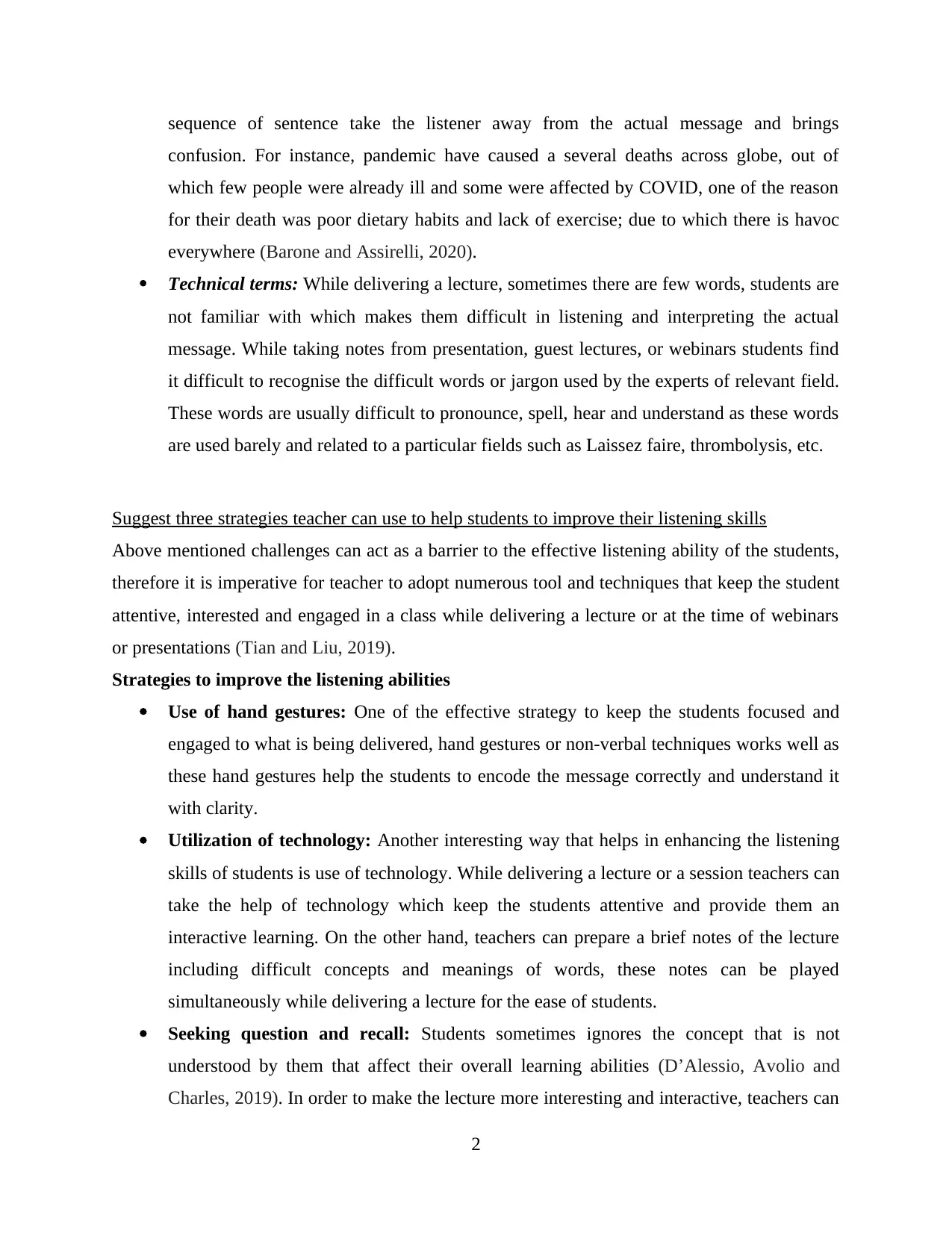
sequence of sentence take the listener away from the actual message and brings
confusion. For instance, pandemic have caused a several deaths across globe, out of
which few people were already ill and some were affected by COVID, one of the reason
for their death was poor dietary habits and lack of exercise; due to which there is havoc
everywhere (Barone and Assirelli, 2020).
Technical terms: While delivering a lecture, sometimes there are few words, students are
not familiar with which makes them difficult in listening and interpreting the actual
message. While taking notes from presentation, guest lectures, or webinars students find
it difficult to recognise the difficult words or jargon used by the experts of relevant field.
These words are usually difficult to pronounce, spell, hear and understand as these words
are used barely and related to a particular fields such as Laissez faire, thrombolysis, etc.
Suggest three strategies teacher can use to help students to improve their listening skills
Above mentioned challenges can act as a barrier to the effective listening ability of the students,
therefore it is imperative for teacher to adopt numerous tool and techniques that keep the student
attentive, interested and engaged in a class while delivering a lecture or at the time of webinars
or presentations (Tian and Liu, 2019).
Strategies to improve the listening abilities
Use of hand gestures: One of the effective strategy to keep the students focused and
engaged to what is being delivered, hand gestures or non-verbal techniques works well as
these hand gestures help the students to encode the message correctly and understand it
with clarity.
Utilization of technology: Another interesting way that helps in enhancing the listening
skills of students is use of technology. While delivering a lecture or a session teachers can
take the help of technology which keep the students attentive and provide them an
interactive learning. On the other hand, teachers can prepare a brief notes of the lecture
including difficult concepts and meanings of words, these notes can be played
simultaneously while delivering a lecture for the ease of students.
Seeking question and recall: Students sometimes ignores the concept that is not
understood by them that affect their overall learning abilities (D’Alessio, Avolio and
Charles, 2019). In order to make the lecture more interesting and interactive, teachers can
2
confusion. For instance, pandemic have caused a several deaths across globe, out of
which few people were already ill and some were affected by COVID, one of the reason
for their death was poor dietary habits and lack of exercise; due to which there is havoc
everywhere (Barone and Assirelli, 2020).
Technical terms: While delivering a lecture, sometimes there are few words, students are
not familiar with which makes them difficult in listening and interpreting the actual
message. While taking notes from presentation, guest lectures, or webinars students find
it difficult to recognise the difficult words or jargon used by the experts of relevant field.
These words are usually difficult to pronounce, spell, hear and understand as these words
are used barely and related to a particular fields such as Laissez faire, thrombolysis, etc.
Suggest three strategies teacher can use to help students to improve their listening skills
Above mentioned challenges can act as a barrier to the effective listening ability of the students,
therefore it is imperative for teacher to adopt numerous tool and techniques that keep the student
attentive, interested and engaged in a class while delivering a lecture or at the time of webinars
or presentations (Tian and Liu, 2019).
Strategies to improve the listening abilities
Use of hand gestures: One of the effective strategy to keep the students focused and
engaged to what is being delivered, hand gestures or non-verbal techniques works well as
these hand gestures help the students to encode the message correctly and understand it
with clarity.
Utilization of technology: Another interesting way that helps in enhancing the listening
skills of students is use of technology. While delivering a lecture or a session teachers can
take the help of technology which keep the students attentive and provide them an
interactive learning. On the other hand, teachers can prepare a brief notes of the lecture
including difficult concepts and meanings of words, these notes can be played
simultaneously while delivering a lecture for the ease of students.
Seeking question and recall: Students sometimes ignores the concept that is not
understood by them that affect their overall learning abilities (D’Alessio, Avolio and
Charles, 2019). In order to make the lecture more interesting and interactive, teachers can
2
Paraphrase This Document
Need a fresh take? Get an instant paraphrase of this document with our AI Paraphraser
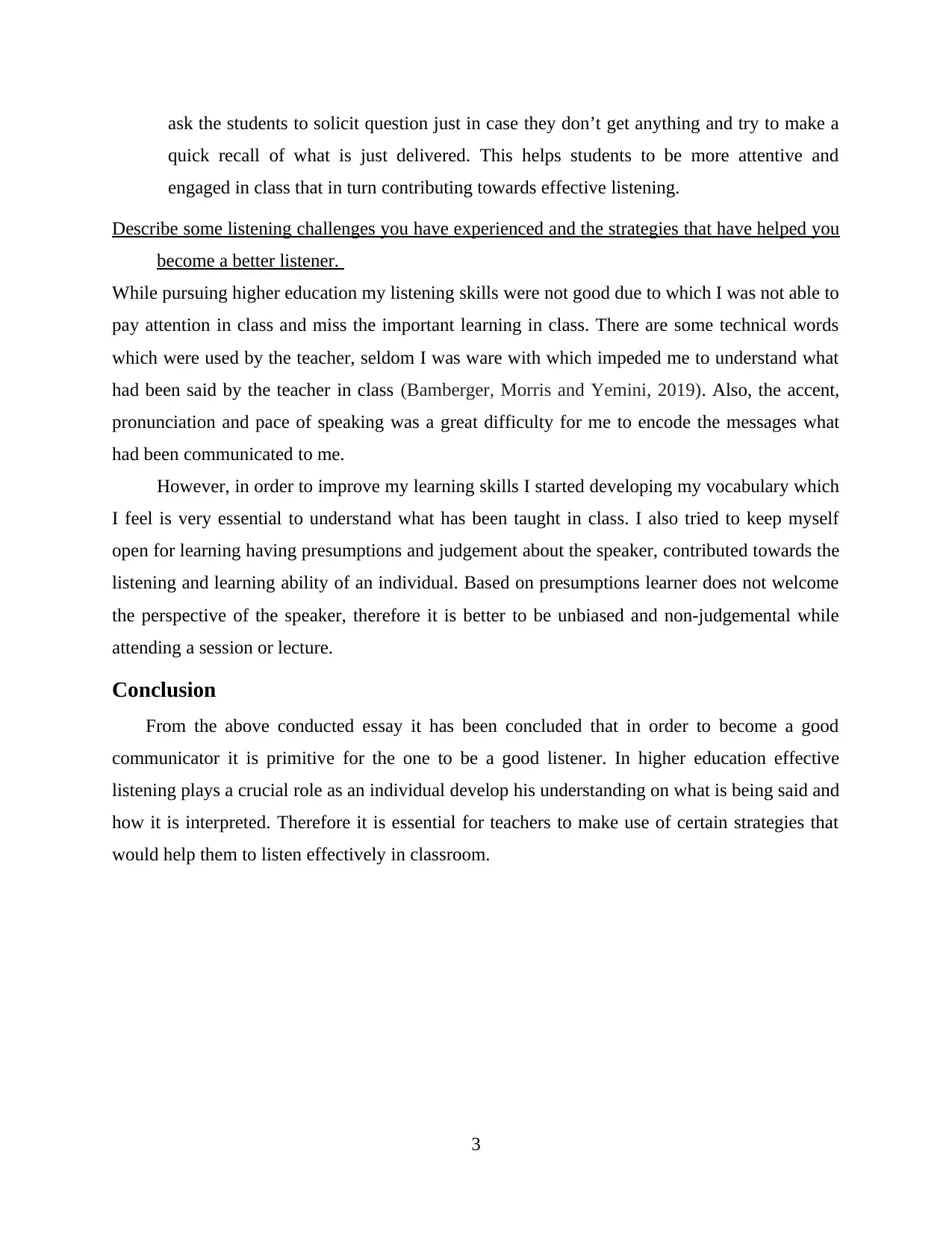
ask the students to solicit question just in case they don’t get anything and try to make a
quick recall of what is just delivered. This helps students to be more attentive and
engaged in class that in turn contributing towards effective listening.
Describe some listening challenges you have experienced and the strategies that have helped you
become a better listener.
While pursuing higher education my listening skills were not good due to which I was not able to
pay attention in class and miss the important learning in class. There are some technical words
which were used by the teacher, seldom I was ware with which impeded me to understand what
had been said by the teacher in class (Bamberger, Morris and Yemini, 2019). Also, the accent,
pronunciation and pace of speaking was a great difficulty for me to encode the messages what
had been communicated to me.
However, in order to improve my learning skills I started developing my vocabulary which
I feel is very essential to understand what has been taught in class. I also tried to keep myself
open for learning having presumptions and judgement about the speaker, contributed towards the
listening and learning ability of an individual. Based on presumptions learner does not welcome
the perspective of the speaker, therefore it is better to be unbiased and non-judgemental while
attending a session or lecture.
Conclusion
From the above conducted essay it has been concluded that in order to become a good
communicator it is primitive for the one to be a good listener. In higher education effective
listening plays a crucial role as an individual develop his understanding on what is being said and
how it is interpreted. Therefore it is essential for teachers to make use of certain strategies that
would help them to listen effectively in classroom.
3
quick recall of what is just delivered. This helps students to be more attentive and
engaged in class that in turn contributing towards effective listening.
Describe some listening challenges you have experienced and the strategies that have helped you
become a better listener.
While pursuing higher education my listening skills were not good due to which I was not able to
pay attention in class and miss the important learning in class. There are some technical words
which were used by the teacher, seldom I was ware with which impeded me to understand what
had been said by the teacher in class (Bamberger, Morris and Yemini, 2019). Also, the accent,
pronunciation and pace of speaking was a great difficulty for me to encode the messages what
had been communicated to me.
However, in order to improve my learning skills I started developing my vocabulary which
I feel is very essential to understand what has been taught in class. I also tried to keep myself
open for learning having presumptions and judgement about the speaker, contributed towards the
listening and learning ability of an individual. Based on presumptions learner does not welcome
the perspective of the speaker, therefore it is better to be unbiased and non-judgemental while
attending a session or lecture.
Conclusion
From the above conducted essay it has been concluded that in order to become a good
communicator it is primitive for the one to be a good listener. In higher education effective
listening plays a crucial role as an individual develop his understanding on what is being said and
how it is interpreted. Therefore it is essential for teachers to make use of certain strategies that
would help them to listen effectively in classroom.
3
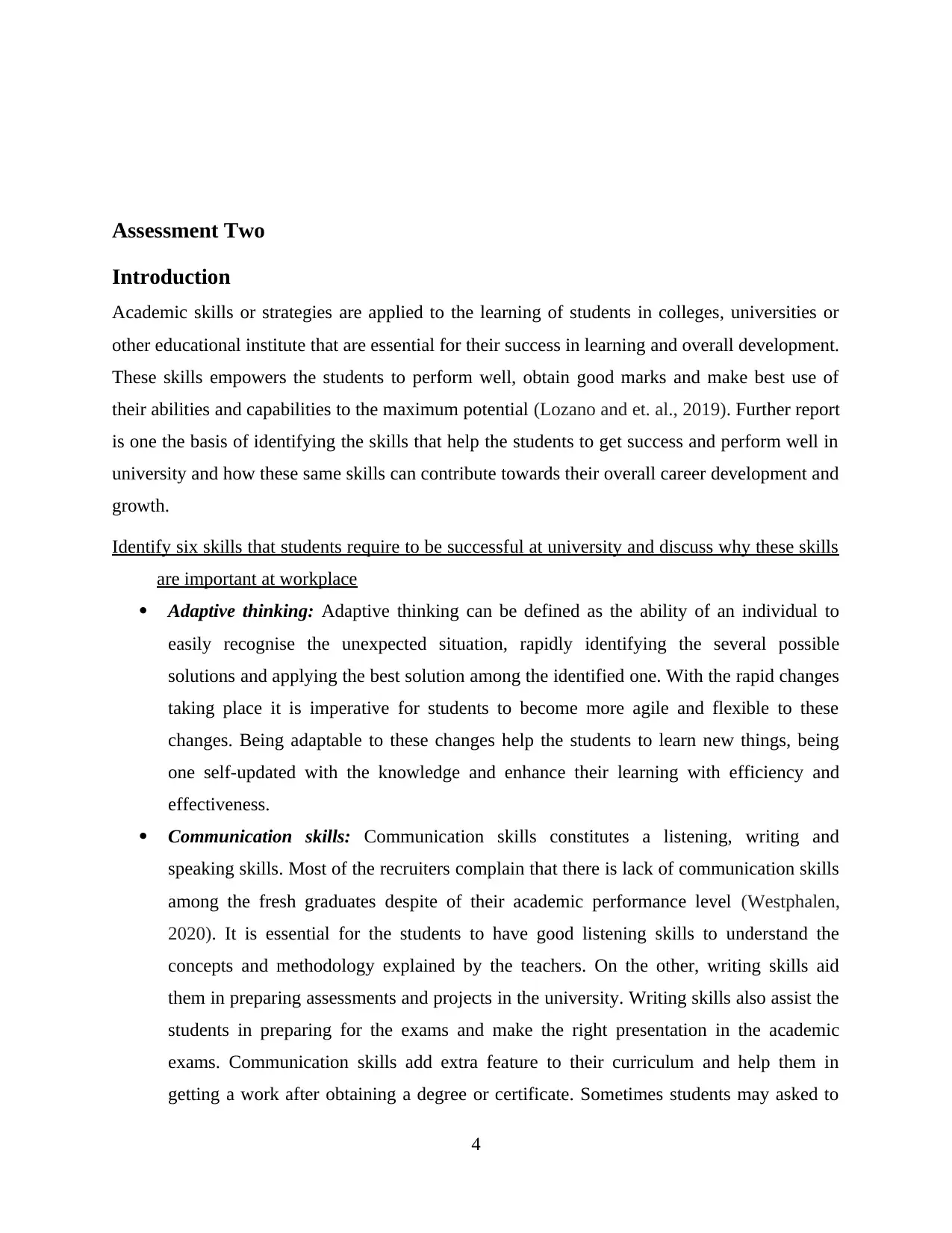
Assessment Two
Introduction
Academic skills or strategies are applied to the learning of students in colleges, universities or
other educational institute that are essential for their success in learning and overall development.
These skills empowers the students to perform well, obtain good marks and make best use of
their abilities and capabilities to the maximum potential (Lozano and et. al., 2019). Further report
is one the basis of identifying the skills that help the students to get success and perform well in
university and how these same skills can contribute towards their overall career development and
growth.
Identify six skills that students require to be successful at university and discuss why these skills
are important at workplace
Adaptive thinking: Adaptive thinking can be defined as the ability of an individual to
easily recognise the unexpected situation, rapidly identifying the several possible
solutions and applying the best solution among the identified one. With the rapid changes
taking place it is imperative for students to become more agile and flexible to these
changes. Being adaptable to these changes help the students to learn new things, being
one self-updated with the knowledge and enhance their learning with efficiency and
effectiveness.
Communication skills: Communication skills constitutes a listening, writing and
speaking skills. Most of the recruiters complain that there is lack of communication skills
among the fresh graduates despite of their academic performance level (Westphalen,
2020). It is essential for the students to have good listening skills to understand the
concepts and methodology explained by the teachers. On the other, writing skills aid
them in preparing assessments and projects in the university. Writing skills also assist the
students in preparing for the exams and make the right presentation in the academic
exams. Communication skills add extra feature to their curriculum and help them in
getting a work after obtaining a degree or certificate. Sometimes students may asked to
4
Introduction
Academic skills or strategies are applied to the learning of students in colleges, universities or
other educational institute that are essential for their success in learning and overall development.
These skills empowers the students to perform well, obtain good marks and make best use of
their abilities and capabilities to the maximum potential (Lozano and et. al., 2019). Further report
is one the basis of identifying the skills that help the students to get success and perform well in
university and how these same skills can contribute towards their overall career development and
growth.
Identify six skills that students require to be successful at university and discuss why these skills
are important at workplace
Adaptive thinking: Adaptive thinking can be defined as the ability of an individual to
easily recognise the unexpected situation, rapidly identifying the several possible
solutions and applying the best solution among the identified one. With the rapid changes
taking place it is imperative for students to become more agile and flexible to these
changes. Being adaptable to these changes help the students to learn new things, being
one self-updated with the knowledge and enhance their learning with efficiency and
effectiveness.
Communication skills: Communication skills constitutes a listening, writing and
speaking skills. Most of the recruiters complain that there is lack of communication skills
among the fresh graduates despite of their academic performance level (Westphalen,
2020). It is essential for the students to have good listening skills to understand the
concepts and methodology explained by the teachers. On the other, writing skills aid
them in preparing assessments and projects in the university. Writing skills also assist the
students in preparing for the exams and make the right presentation in the academic
exams. Communication skills add extra feature to their curriculum and help them in
getting a work after obtaining a degree or certificate. Sometimes students may asked to
4
⊘ This is a preview!⊘
Do you want full access?
Subscribe today to unlock all pages.

Trusted by 1+ million students worldwide
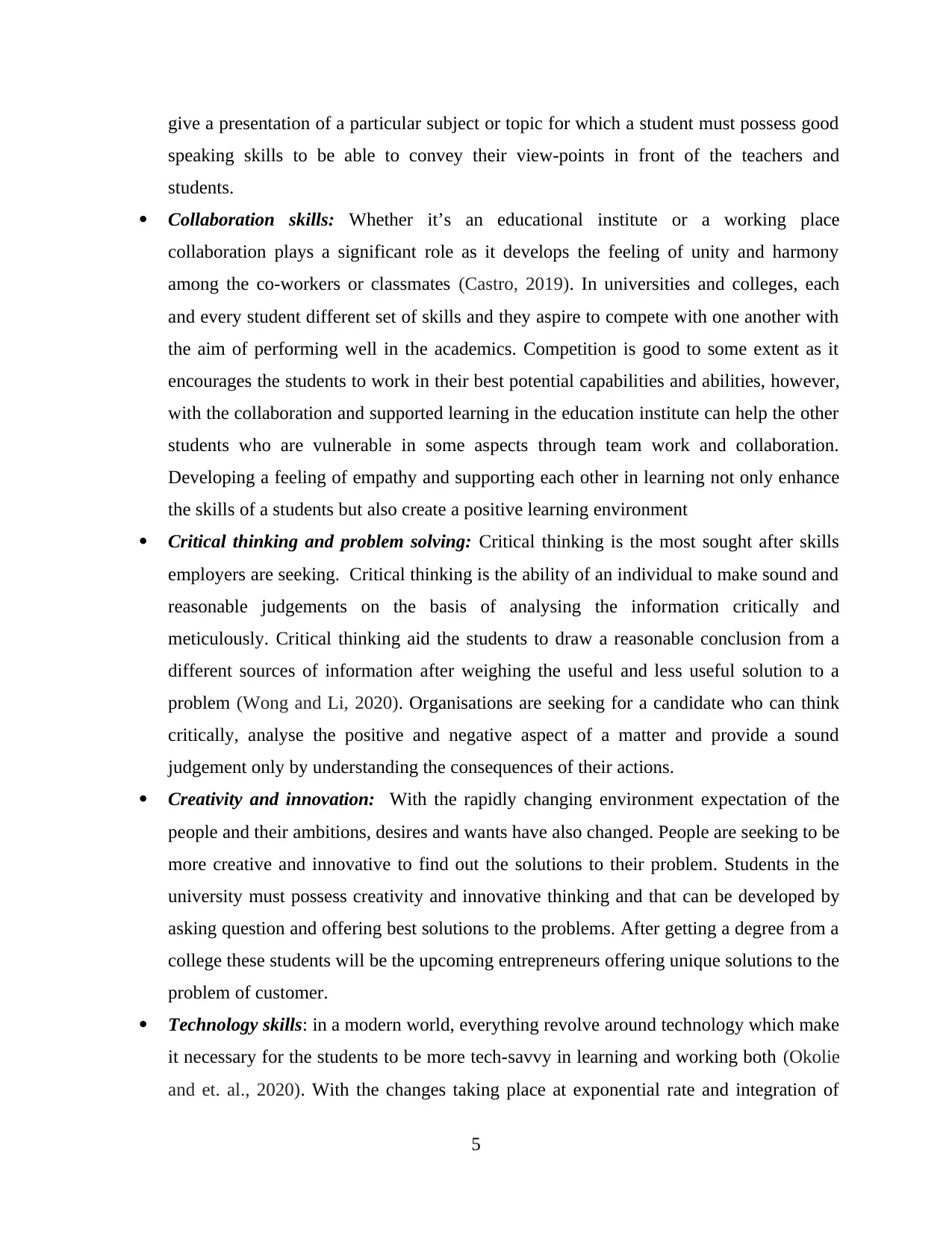
give a presentation of a particular subject or topic for which a student must possess good
speaking skills to be able to convey their view-points in front of the teachers and
students.
Collaboration skills: Whether it’s an educational institute or a working place
collaboration plays a significant role as it develops the feeling of unity and harmony
among the co-workers or classmates (Castro, 2019). In universities and colleges, each
and every student different set of skills and they aspire to compete with one another with
the aim of performing well in the academics. Competition is good to some extent as it
encourages the students to work in their best potential capabilities and abilities, however,
with the collaboration and supported learning in the education institute can help the other
students who are vulnerable in some aspects through team work and collaboration.
Developing a feeling of empathy and supporting each other in learning not only enhance
the skills of a students but also create a positive learning environment
Critical thinking and problem solving: Critical thinking is the most sought after skills
employers are seeking. Critical thinking is the ability of an individual to make sound and
reasonable judgements on the basis of analysing the information critically and
meticulously. Critical thinking aid the students to draw a reasonable conclusion from a
different sources of information after weighing the useful and less useful solution to a
problem (Wong and Li, 2020). Organisations are seeking for a candidate who can think
critically, analyse the positive and negative aspect of a matter and provide a sound
judgement only by understanding the consequences of their actions.
Creativity and innovation: With the rapidly changing environment expectation of the
people and their ambitions, desires and wants have also changed. People are seeking to be
more creative and innovative to find out the solutions to their problem. Students in the
university must possess creativity and innovative thinking and that can be developed by
asking question and offering best solutions to the problems. After getting a degree from a
college these students will be the upcoming entrepreneurs offering unique solutions to the
problem of customer.
Technology skills: in a modern world, everything revolve around technology which make
it necessary for the students to be more tech-savvy in learning and working both (Okolie
and et. al., 2020). With the changes taking place at exponential rate and integration of
5
speaking skills to be able to convey their view-points in front of the teachers and
students.
Collaboration skills: Whether it’s an educational institute or a working place
collaboration plays a significant role as it develops the feeling of unity and harmony
among the co-workers or classmates (Castro, 2019). In universities and colleges, each
and every student different set of skills and they aspire to compete with one another with
the aim of performing well in the academics. Competition is good to some extent as it
encourages the students to work in their best potential capabilities and abilities, however,
with the collaboration and supported learning in the education institute can help the other
students who are vulnerable in some aspects through team work and collaboration.
Developing a feeling of empathy and supporting each other in learning not only enhance
the skills of a students but also create a positive learning environment
Critical thinking and problem solving: Critical thinking is the most sought after skills
employers are seeking. Critical thinking is the ability of an individual to make sound and
reasonable judgements on the basis of analysing the information critically and
meticulously. Critical thinking aid the students to draw a reasonable conclusion from a
different sources of information after weighing the useful and less useful solution to a
problem (Wong and Li, 2020). Organisations are seeking for a candidate who can think
critically, analyse the positive and negative aspect of a matter and provide a sound
judgement only by understanding the consequences of their actions.
Creativity and innovation: With the rapidly changing environment expectation of the
people and their ambitions, desires and wants have also changed. People are seeking to be
more creative and innovative to find out the solutions to their problem. Students in the
university must possess creativity and innovative thinking and that can be developed by
asking question and offering best solutions to the problems. After getting a degree from a
college these students will be the upcoming entrepreneurs offering unique solutions to the
problem of customer.
Technology skills: in a modern world, everything revolve around technology which make
it necessary for the students to be more tech-savvy in learning and working both (Okolie
and et. al., 2020). With the changes taking place at exponential rate and integration of
5
Paraphrase This Document
Need a fresh take? Get an instant paraphrase of this document with our AI Paraphraser
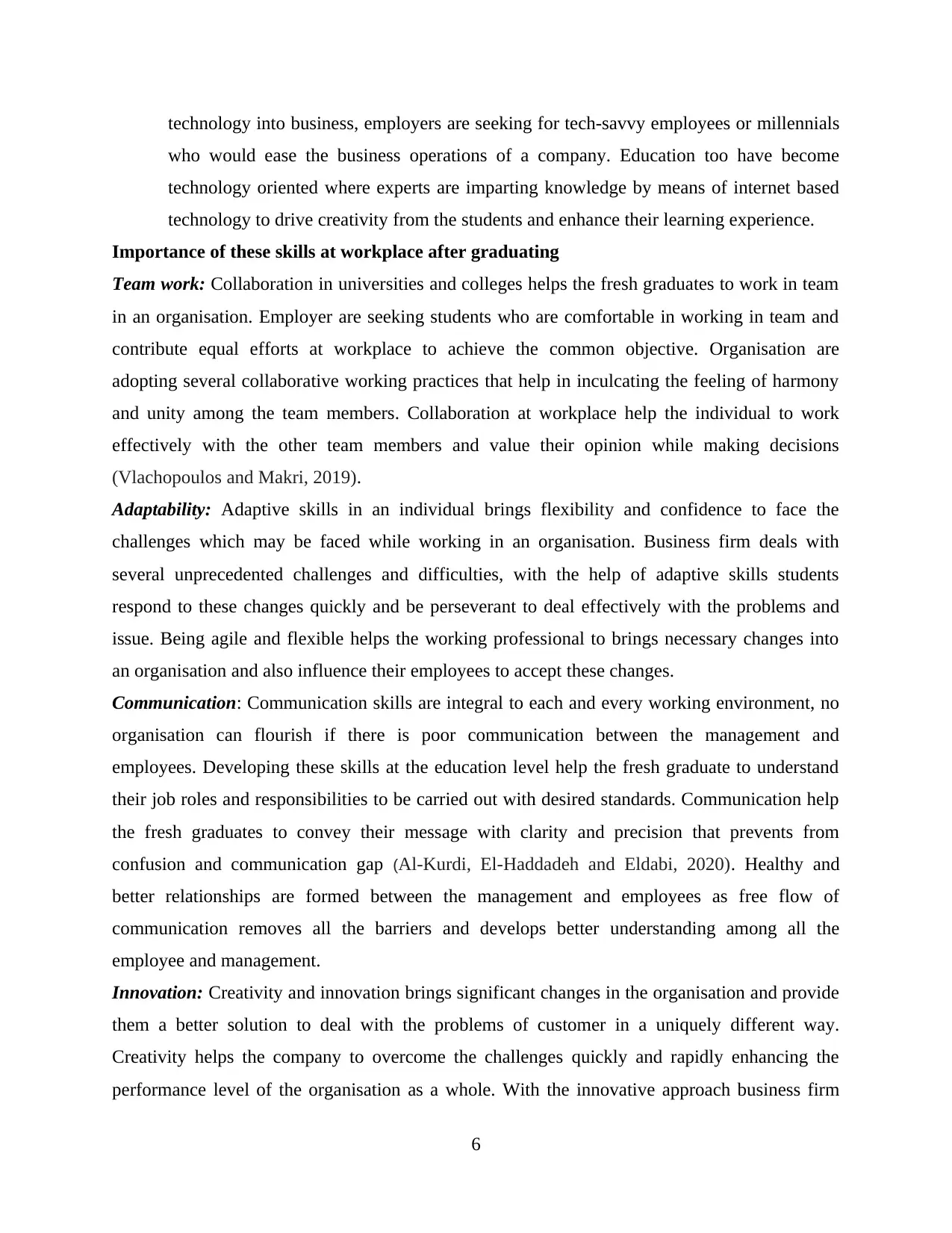
technology into business, employers are seeking for tech-savvy employees or millennials
who would ease the business operations of a company. Education too have become
technology oriented where experts are imparting knowledge by means of internet based
technology to drive creativity from the students and enhance their learning experience.
Importance of these skills at workplace after graduating
Team work: Collaboration in universities and colleges helps the fresh graduates to work in team
in an organisation. Employer are seeking students who are comfortable in working in team and
contribute equal efforts at workplace to achieve the common objective. Organisation are
adopting several collaborative working practices that help in inculcating the feeling of harmony
and unity among the team members. Collaboration at workplace help the individual to work
effectively with the other team members and value their opinion while making decisions
(Vlachopoulos and Makri, 2019).
Adaptability: Adaptive skills in an individual brings flexibility and confidence to face the
challenges which may be faced while working in an organisation. Business firm deals with
several unprecedented challenges and difficulties, with the help of adaptive skills students
respond to these changes quickly and be perseverant to deal effectively with the problems and
issue. Being agile and flexible helps the working professional to brings necessary changes into
an organisation and also influence their employees to accept these changes.
Communication: Communication skills are integral to each and every working environment, no
organisation can flourish if there is poor communication between the management and
employees. Developing these skills at the education level help the fresh graduate to understand
their job roles and responsibilities to be carried out with desired standards. Communication help
the fresh graduates to convey their message with clarity and precision that prevents from
confusion and communication gap (Al-Kurdi, El-Haddadeh and Eldabi, 2020). Healthy and
better relationships are formed between the management and employees as free flow of
communication removes all the barriers and develops better understanding among all the
employee and management.
Innovation: Creativity and innovation brings significant changes in the organisation and provide
them a better solution to deal with the problems of customer in a uniquely different way.
Creativity helps the company to overcome the challenges quickly and rapidly enhancing the
performance level of the organisation as a whole. With the innovative approach business firm
6
who would ease the business operations of a company. Education too have become
technology oriented where experts are imparting knowledge by means of internet based
technology to drive creativity from the students and enhance their learning experience.
Importance of these skills at workplace after graduating
Team work: Collaboration in universities and colleges helps the fresh graduates to work in team
in an organisation. Employer are seeking students who are comfortable in working in team and
contribute equal efforts at workplace to achieve the common objective. Organisation are
adopting several collaborative working practices that help in inculcating the feeling of harmony
and unity among the team members. Collaboration at workplace help the individual to work
effectively with the other team members and value their opinion while making decisions
(Vlachopoulos and Makri, 2019).
Adaptability: Adaptive skills in an individual brings flexibility and confidence to face the
challenges which may be faced while working in an organisation. Business firm deals with
several unprecedented challenges and difficulties, with the help of adaptive skills students
respond to these changes quickly and be perseverant to deal effectively with the problems and
issue. Being agile and flexible helps the working professional to brings necessary changes into
an organisation and also influence their employees to accept these changes.
Communication: Communication skills are integral to each and every working environment, no
organisation can flourish if there is poor communication between the management and
employees. Developing these skills at the education level help the fresh graduate to understand
their job roles and responsibilities to be carried out with desired standards. Communication help
the fresh graduates to convey their message with clarity and precision that prevents from
confusion and communication gap (Al-Kurdi, El-Haddadeh and Eldabi, 2020). Healthy and
better relationships are formed between the management and employees as free flow of
communication removes all the barriers and develops better understanding among all the
employee and management.
Innovation: Creativity and innovation brings significant changes in the organisation and provide
them a better solution to deal with the problems of customer in a uniquely different way.
Creativity helps the company to overcome the challenges quickly and rapidly enhancing the
performance level of the organisation as a whole. With the innovative approach business firm
6
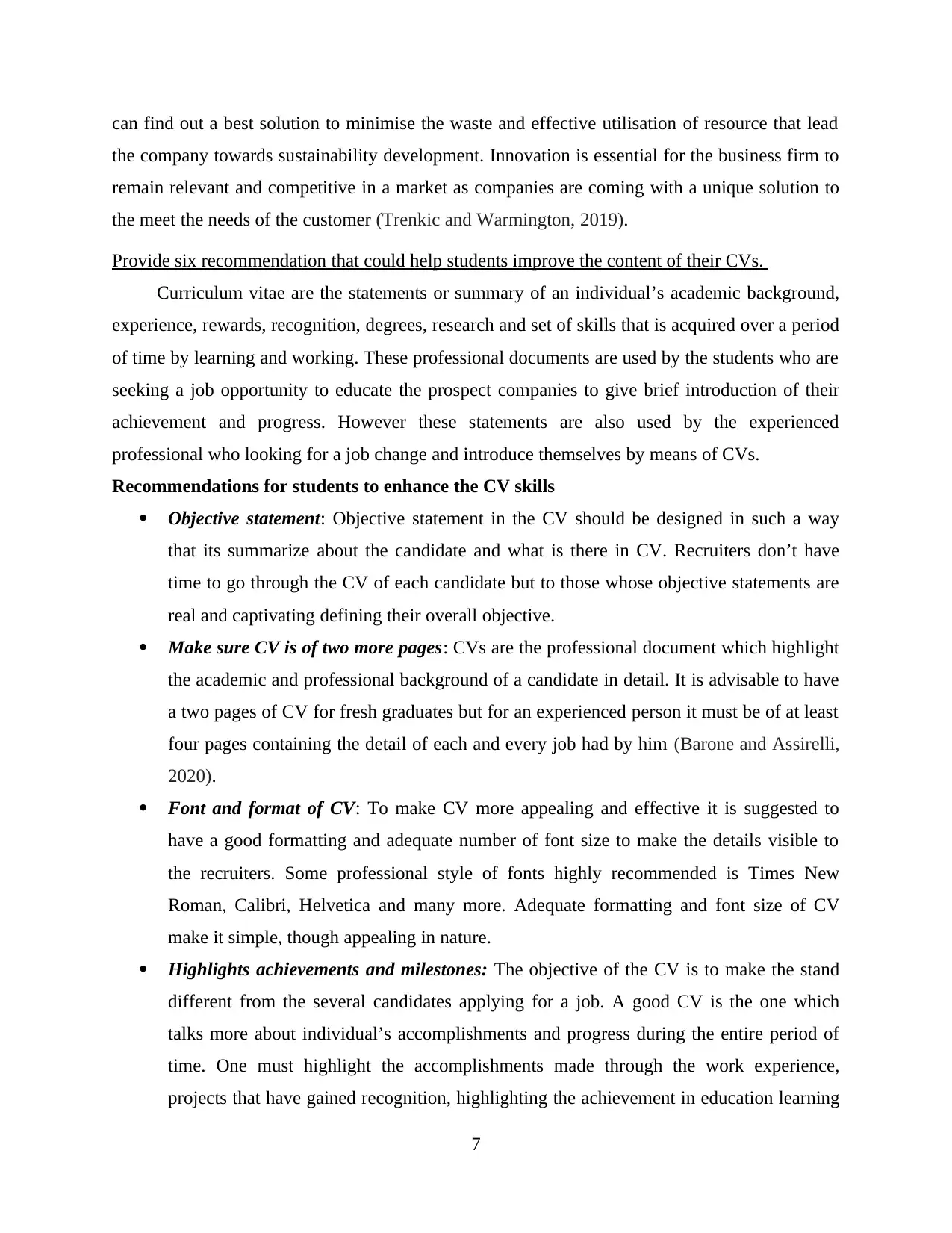
can find out a best solution to minimise the waste and effective utilisation of resource that lead
the company towards sustainability development. Innovation is essential for the business firm to
remain relevant and competitive in a market as companies are coming with a unique solution to
the meet the needs of the customer (Trenkic and Warmington, 2019).
Provide six recommendation that could help students improve the content of their CVs.
Curriculum vitae are the statements or summary of an individual’s academic background,
experience, rewards, recognition, degrees, research and set of skills that is acquired over a period
of time by learning and working. These professional documents are used by the students who are
seeking a job opportunity to educate the prospect companies to give brief introduction of their
achievement and progress. However these statements are also used by the experienced
professional who looking for a job change and introduce themselves by means of CVs.
Recommendations for students to enhance the CV skills
Objective statement: Objective statement in the CV should be designed in such a way
that its summarize about the candidate and what is there in CV. Recruiters don’t have
time to go through the CV of each candidate but to those whose objective statements are
real and captivating defining their overall objective.
Make sure CV is of two more pages: CVs are the professional document which highlight
the academic and professional background of a candidate in detail. It is advisable to have
a two pages of CV for fresh graduates but for an experienced person it must be of at least
four pages containing the detail of each and every job had by him (Barone and Assirelli,
2020).
Font and format of CV: To make CV more appealing and effective it is suggested to
have a good formatting and adequate number of font size to make the details visible to
the recruiters. Some professional style of fonts highly recommended is Times New
Roman, Calibri, Helvetica and many more. Adequate formatting and font size of CV
make it simple, though appealing in nature.
Highlights achievements and milestones: The objective of the CV is to make the stand
different from the several candidates applying for a job. A good CV is the one which
talks more about individual’s accomplishments and progress during the entire period of
time. One must highlight the accomplishments made through the work experience,
projects that have gained recognition, highlighting the achievement in education learning
7
the company towards sustainability development. Innovation is essential for the business firm to
remain relevant and competitive in a market as companies are coming with a unique solution to
the meet the needs of the customer (Trenkic and Warmington, 2019).
Provide six recommendation that could help students improve the content of their CVs.
Curriculum vitae are the statements or summary of an individual’s academic background,
experience, rewards, recognition, degrees, research and set of skills that is acquired over a period
of time by learning and working. These professional documents are used by the students who are
seeking a job opportunity to educate the prospect companies to give brief introduction of their
achievement and progress. However these statements are also used by the experienced
professional who looking for a job change and introduce themselves by means of CVs.
Recommendations for students to enhance the CV skills
Objective statement: Objective statement in the CV should be designed in such a way
that its summarize about the candidate and what is there in CV. Recruiters don’t have
time to go through the CV of each candidate but to those whose objective statements are
real and captivating defining their overall objective.
Make sure CV is of two more pages: CVs are the professional document which highlight
the academic and professional background of a candidate in detail. It is advisable to have
a two pages of CV for fresh graduates but for an experienced person it must be of at least
four pages containing the detail of each and every job had by him (Barone and Assirelli,
2020).
Font and format of CV: To make CV more appealing and effective it is suggested to
have a good formatting and adequate number of font size to make the details visible to
the recruiters. Some professional style of fonts highly recommended is Times New
Roman, Calibri, Helvetica and many more. Adequate formatting and font size of CV
make it simple, though appealing in nature.
Highlights achievements and milestones: The objective of the CV is to make the stand
different from the several candidates applying for a job. A good CV is the one which
talks more about individual’s accomplishments and progress during the entire period of
time. One must highlight the accomplishments made through the work experience,
projects that have gained recognition, highlighting the achievement in education learning
7
⊘ This is a preview!⊘
Do you want full access?
Subscribe today to unlock all pages.

Trusted by 1+ million students worldwide
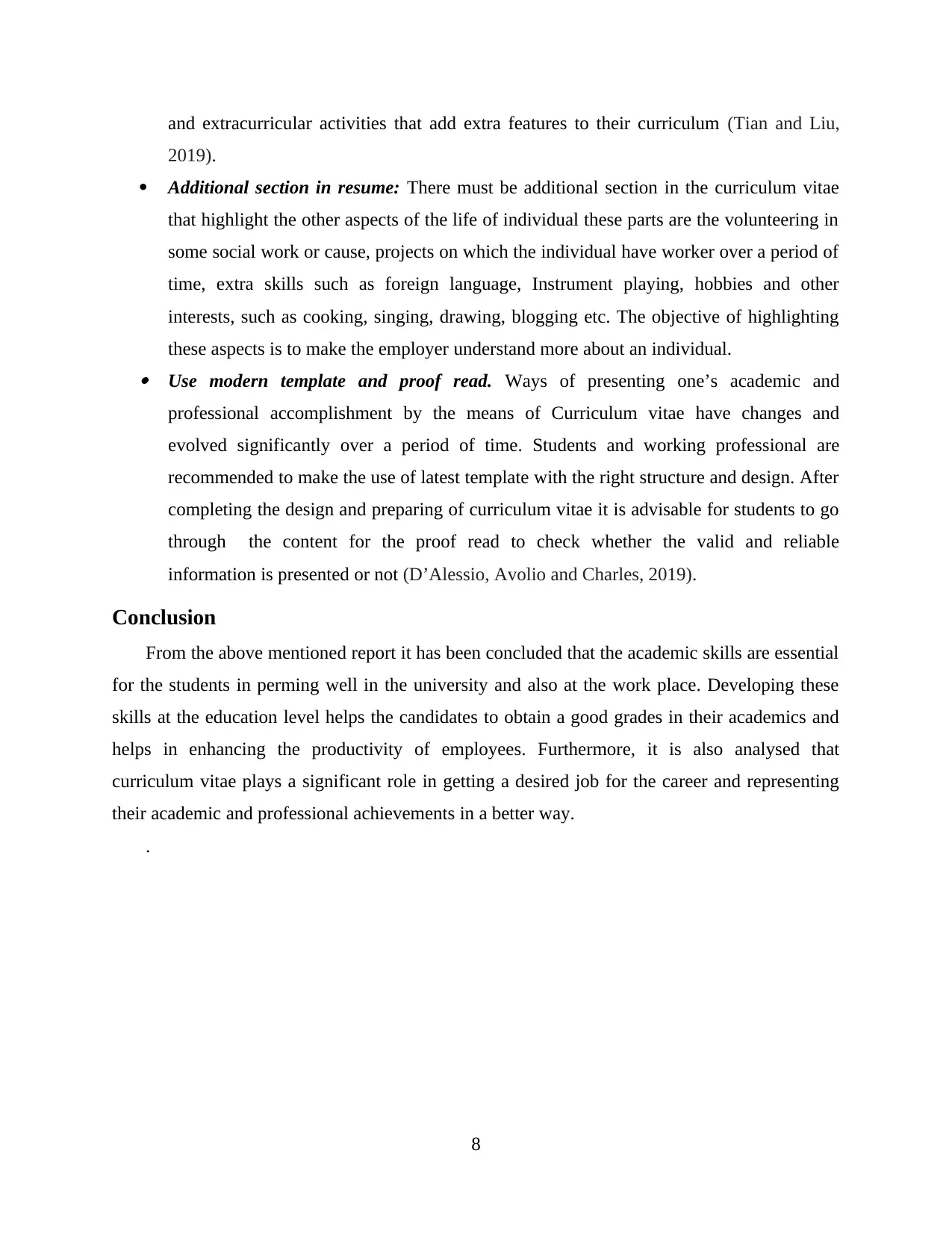
and extracurricular activities that add extra features to their curriculum (Tian and Liu,
2019).
Additional section in resume: There must be additional section in the curriculum vitae
that highlight the other aspects of the life of individual these parts are the volunteering in
some social work or cause, projects on which the individual have worker over a period of
time, extra skills such as foreign language, Instrument playing, hobbies and other
interests, such as cooking, singing, drawing, blogging etc. The objective of highlighting
these aspects is to make the employer understand more about an individual. Use modern template and proof read. Ways of presenting one’s academic and
professional accomplishment by the means of Curriculum vitae have changes and
evolved significantly over a period of time. Students and working professional are
recommended to make the use of latest template with the right structure and design. After
completing the design and preparing of curriculum vitae it is advisable for students to go
through the content for the proof read to check whether the valid and reliable
information is presented or not (D’Alessio, Avolio and Charles, 2019).
Conclusion
From the above mentioned report it has been concluded that the academic skills are essential
for the students in perming well in the university and also at the work place. Developing these
skills at the education level helps the candidates to obtain a good grades in their academics and
helps in enhancing the productivity of employees. Furthermore, it is also analysed that
curriculum vitae plays a significant role in getting a desired job for the career and representing
their academic and professional achievements in a better way.
.
8
2019).
Additional section in resume: There must be additional section in the curriculum vitae
that highlight the other aspects of the life of individual these parts are the volunteering in
some social work or cause, projects on which the individual have worker over a period of
time, extra skills such as foreign language, Instrument playing, hobbies and other
interests, such as cooking, singing, drawing, blogging etc. The objective of highlighting
these aspects is to make the employer understand more about an individual. Use modern template and proof read. Ways of presenting one’s academic and
professional accomplishment by the means of Curriculum vitae have changes and
evolved significantly over a period of time. Students and working professional are
recommended to make the use of latest template with the right structure and design. After
completing the design and preparing of curriculum vitae it is advisable for students to go
through the content for the proof read to check whether the valid and reliable
information is presented or not (D’Alessio, Avolio and Charles, 2019).
Conclusion
From the above mentioned report it has been concluded that the academic skills are essential
for the students in perming well in the university and also at the work place. Developing these
skills at the education level helps the candidates to obtain a good grades in their academics and
helps in enhancing the productivity of employees. Furthermore, it is also analysed that
curriculum vitae plays a significant role in getting a desired job for the career and representing
their academic and professional achievements in a better way.
.
8
Paraphrase This Document
Need a fresh take? Get an instant paraphrase of this document with our AI Paraphraser
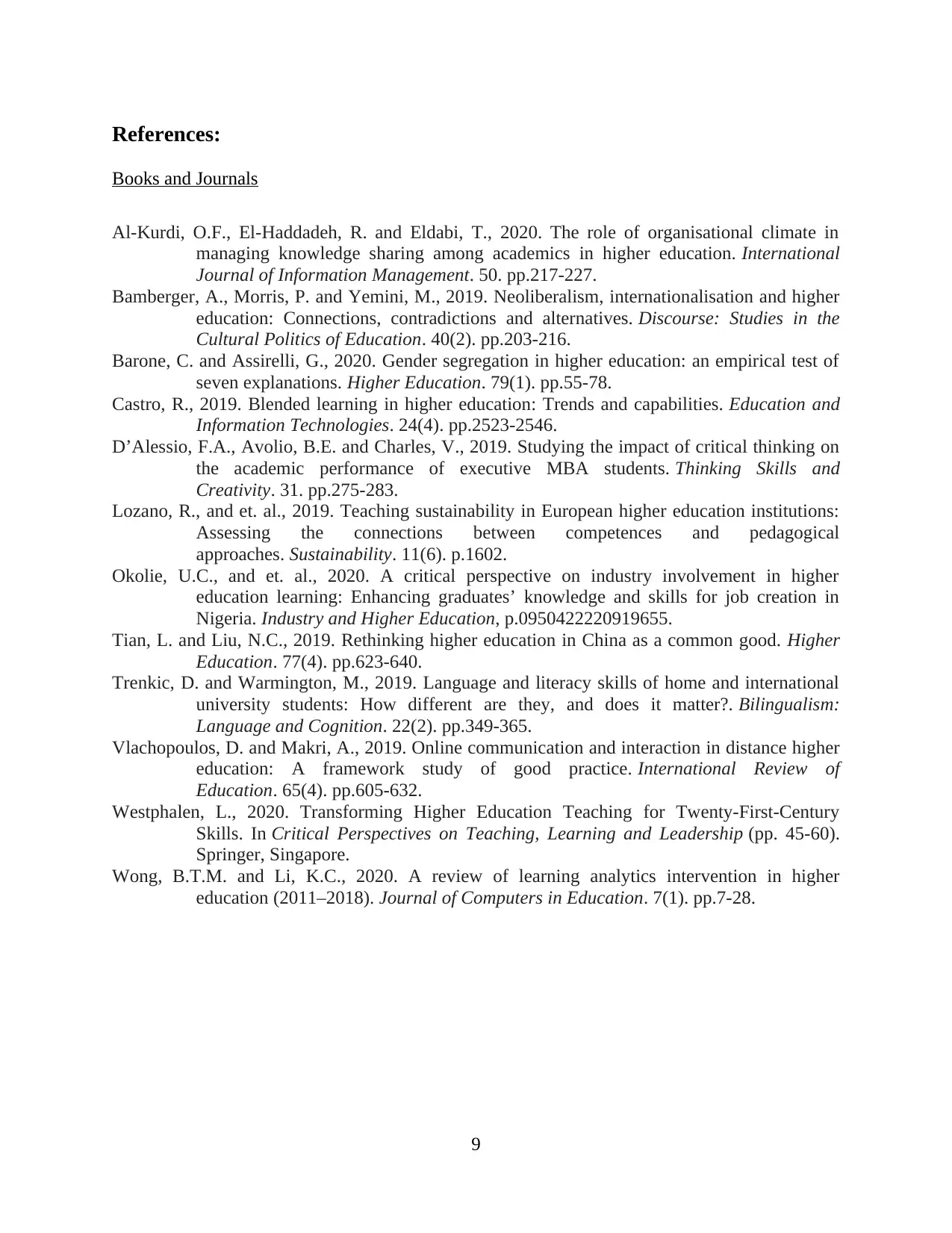
References:
Books and Journals
Al-Kurdi, O.F., El-Haddadeh, R. and Eldabi, T., 2020. The role of organisational climate in
managing knowledge sharing among academics in higher education. International
Journal of Information Management. 50. pp.217-227.
Bamberger, A., Morris, P. and Yemini, M., 2019. Neoliberalism, internationalisation and higher
education: Connections, contradictions and alternatives. Discourse: Studies in the
Cultural Politics of Education. 40(2). pp.203-216.
Barone, C. and Assirelli, G., 2020. Gender segregation in higher education: an empirical test of
seven explanations. Higher Education. 79(1). pp.55-78.
Castro, R., 2019. Blended learning in higher education: Trends and capabilities. Education and
Information Technologies. 24(4). pp.2523-2546.
D’Alessio, F.A., Avolio, B.E. and Charles, V., 2019. Studying the impact of critical thinking on
the academic performance of executive MBA students. Thinking Skills and
Creativity. 31. pp.275-283.
Lozano, R., and et. al., 2019. Teaching sustainability in European higher education institutions:
Assessing the connections between competences and pedagogical
approaches. Sustainability. 11(6). p.1602.
Okolie, U.C., and et. al., 2020. A critical perspective on industry involvement in higher
education learning: Enhancing graduates’ knowledge and skills for job creation in
Nigeria. Industry and Higher Education, p.0950422220919655.
Tian, L. and Liu, N.C., 2019. Rethinking higher education in China as a common good. Higher
Education. 77(4). pp.623-640.
Trenkic, D. and Warmington, M., 2019. Language and literacy skills of home and international
university students: How different are they, and does it matter?. Bilingualism:
Language and Cognition. 22(2). pp.349-365.
Vlachopoulos, D. and Makri, A., 2019. Online communication and interaction in distance higher
education: A framework study of good practice. International Review of
Education. 65(4). pp.605-632.
Westphalen, L., 2020. Transforming Higher Education Teaching for Twenty-First-Century
Skills. In Critical Perspectives on Teaching, Learning and Leadership (pp. 45-60).
Springer, Singapore.
Wong, B.T.M. and Li, K.C., 2020. A review of learning analytics intervention in higher
education (2011–2018). Journal of Computers in Education. 7(1). pp.7-28.
9
Books and Journals
Al-Kurdi, O.F., El-Haddadeh, R. and Eldabi, T., 2020. The role of organisational climate in
managing knowledge sharing among academics in higher education. International
Journal of Information Management. 50. pp.217-227.
Bamberger, A., Morris, P. and Yemini, M., 2019. Neoliberalism, internationalisation and higher
education: Connections, contradictions and alternatives. Discourse: Studies in the
Cultural Politics of Education. 40(2). pp.203-216.
Barone, C. and Assirelli, G., 2020. Gender segregation in higher education: an empirical test of
seven explanations. Higher Education. 79(1). pp.55-78.
Castro, R., 2019. Blended learning in higher education: Trends and capabilities. Education and
Information Technologies. 24(4). pp.2523-2546.
D’Alessio, F.A., Avolio, B.E. and Charles, V., 2019. Studying the impact of critical thinking on
the academic performance of executive MBA students. Thinking Skills and
Creativity. 31. pp.275-283.
Lozano, R., and et. al., 2019. Teaching sustainability in European higher education institutions:
Assessing the connections between competences and pedagogical
approaches. Sustainability. 11(6). p.1602.
Okolie, U.C., and et. al., 2020. A critical perspective on industry involvement in higher
education learning: Enhancing graduates’ knowledge and skills for job creation in
Nigeria. Industry and Higher Education, p.0950422220919655.
Tian, L. and Liu, N.C., 2019. Rethinking higher education in China as a common good. Higher
Education. 77(4). pp.623-640.
Trenkic, D. and Warmington, M., 2019. Language and literacy skills of home and international
university students: How different are they, and does it matter?. Bilingualism:
Language and Cognition. 22(2). pp.349-365.
Vlachopoulos, D. and Makri, A., 2019. Online communication and interaction in distance higher
education: A framework study of good practice. International Review of
Education. 65(4). pp.605-632.
Westphalen, L., 2020. Transforming Higher Education Teaching for Twenty-First-Century
Skills. In Critical Perspectives on Teaching, Learning and Leadership (pp. 45-60).
Springer, Singapore.
Wong, B.T.M. and Li, K.C., 2020. A review of learning analytics intervention in higher
education (2011–2018). Journal of Computers in Education. 7(1). pp.7-28.
9

10
⊘ This is a preview!⊘
Do you want full access?
Subscribe today to unlock all pages.

Trusted by 1+ million students worldwide
1 out of 12
Related Documents
Your All-in-One AI-Powered Toolkit for Academic Success.
+13062052269
info@desklib.com
Available 24*7 on WhatsApp / Email
![[object Object]](/_next/static/media/star-bottom.7253800d.svg)
Unlock your academic potential
Copyright © 2020–2025 A2Z Services. All Rights Reserved. Developed and managed by ZUCOL.




